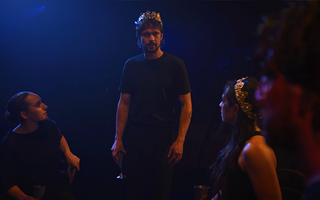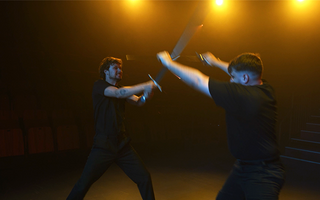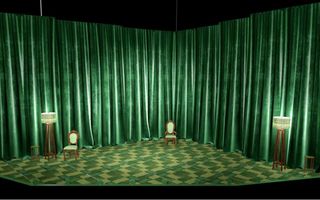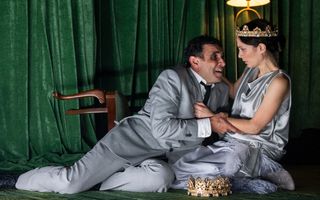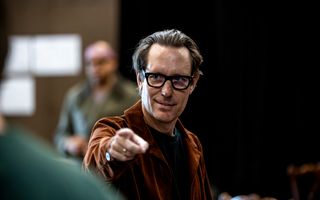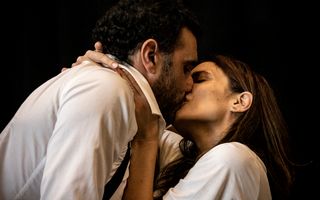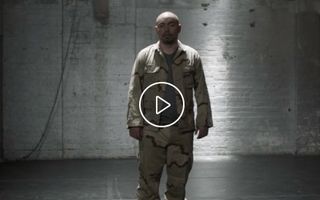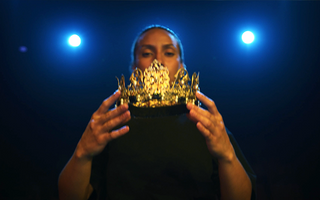 Watch
Watch
Blood
Blood and the word ‘bloody’ is mentioned frequently throughout Macbeth – 41 uses, to be exact. The play opens with a violent battle described by a wounded, ‘bleeding’ captain. At the appearance of the captain, King Duncan says “What bloody man is that?” The loss of blood and survival is synonymous with heroism in battle, to the point where Duncan says: “Thy words become thee as thy wounds / They smack of honour both.” (Act 1, Scene 2) In fact blood is one of the main images in Macbeth’s imagination and is somewhat of an obsession for him: “It will have blood, they say: blood will have blood.” (Act 3, Scene 4) He even imagines himself wading through a river made of blood: “I am in blood / Stepped in so far that should I wade no more / Returning were as tedious as go o'er.” (Act 3, Scene 4) When Lady Macbeth plots to kill Duncan, she calls upon dark spirits to “make thick my blood”. (Act 1, Scene 5) Blood was thought to be thickened by poison, hence Lady Macbeth wants to poison her own soul so that she is able to kill Duncan without remorse.
Once Macbeth and Lady Macbeth embark upon their murderous journey, blood comes to symbolise their guilt, and they begin to feel that their crimes have stained them in a way that cannot be washed clean. Macbeth asks “Will all great Neptune’s ocean wash this blood / Clean from my hand?” after he has killed Duncan, even as his wife scolds him and says that “a little water” will clear them of the deed. (Act 2, Scene 2) Later, Lady Macbeth comes to share Macbeth’s horrified sense of being stained: “Out, damned spot; out, I say... who would have thought the old man to have had so much blood in him?” she asks as she sleepwalks near the close of the play (Act 5, Scene 1). Blood symbolises the guilt that sits like a permanent stain on the consciences of both Macbeth and Lady Macbeth, one that hounds them to their graves.
Sleep
Sleep and the lack of sleep exacerbates the angst, confusion and destruction in the play. When King Duncan comes to stay at Macbeth’s home, he is killed while he is asleep. During the murder Macbeth imagines hearing a voice cry, “Sleep no more”. (Act 2, Scene 2) Some interpret this as a clue that Macbeth develops permanent insomnia, and in fact never sleeps again for the remainder of the play’s action. Soon after the murder, in another part of the castle, Macbeth’s Porter rants about his sleep being disturbed by a loud knocking at the gate: “Here’s a knocking indeed!” (Act 2, Scene 3) After Macbeth’s outburst at the banquet in Act 3 where he sees Banquo’s ghost, Lady Macbeth suggests he gets some rest to soothe his addled mind, “You lack the season of all natures, sleep.” (Act 3, Scene 4)
When Lady Macbeth loses her grip on the world, this too manifests in disturbed sleep. We see her sleepwalking and sleeptalking, recounting events from the play as she does so, as if she cannot completely rest or escape the guilt of their actions. When she sleepwalks Lady Macbeth reveals truths to the Doctor and Gentlewoman, and the audience. Her conclusion, “What’s done cannot be undone. To bed, to bed, to bed” (Act 5, Scene 1) suggests both an echo of her former self at the scene of Duncan's murder, and a longing for peace that is now denied her.
Clothing
There are several references throughout Macbeth to a character’s readiness or suitability for their social position based on clothing and associated imagery. Macbeth himself often alludes to a discomfort he feels due to being prematurely adorned in a role he either did not expect, does not feel he deserves or one he has unlawfully usurped. In Act 1 when he hears he has been promoted to the Thane of Cawdor, he states: “The Thane of Cawdor lives; why do you dress me / In borrow’d robes?” (Act 1, Scene 3) Banquo also analyses Macbeth’s uneasiness in adjusting to this new role through the use of clothing imagery when he states: “New honours come upon him, / Like our strange garments, cleave not to their mould / But with the aid of use.” (Act 1, Scene 3)
When Macbeth’s manhood is then challenged by Lady Macbeth he defends the importance of this position and Duncan’s trust by stating: “He hath honour’d me of late; and I have bought / Golden opinions from all sorts of people, / Which would be worn now in their newest gloss, / Not cast aside so soon.” (Act 1, Scene 7) Macbeth is patient, and wishes to ‘wear’ this new position in all its new glory, not reject the gifts that Duncan has bestowed upon him. Macbeth’s apprehension and negative relationship with his robes or roles work to foreshadow his impending failure.
As the Scottish forces march to join the English army before Macbeth’s castle, various Scotsmen comment on Macbeth’s inadequacies and thus desperate situation. Angus says, “Those he commands move only in command, / Nothing in love: now does he feel his title / Hang loose about him, like a giant’s robe / Upon a dwarfish thief.” (Act 5, Scene 2)
Birds and Nature (and Disruptions in Nature)
Shakespeare repeatedly utilises natural imagery in its darkest form in Macbeth, and presents the idea that nature has been turned upside down. It was a common belief in the Jacobean era that the sovereign was intrinsically linked to the balance of the natural state. If a ruler lacked in ability, honour or moral fibre, the natural elements around him and his state would be affected, causing the natural order of things to invert or disintegrate. After King Duncan’s murder it is reported that his horses turn wild and eat each other, and a hunting falcon is killed by a bird that should be its prey:
A falcon, towering in her pride of place,
Was by a mousing owl hawk’d at and kill’d.
Act 2, Scene 4
Bird imagery is particularly prominent in this play. Shakespeare draws on well-known symbols of prey to emphasise the rise of the darker side of the natural world. When Lady Macbeth hears that Duncan will be visiting her castle she states: “The raven himself is hoarse / That croaks the fatal entrance of Duncan / Under my battlements.” (Act 1, Scene 5) The raven is a bird of ill omen, and Lady Macbeth means that the raven is hoarse from saying again and again that King Duncan must die. When King Duncan does arrive at Macbeth’s castle, he remarks how sweet the air is. Banquo agrees, adding:
This guest of summer,
The temple-haunting martlet, does approve,
By his loved mansionry, that the heaven’s breath
Smells wooingly here: no jutty, frieze,
Buttress, nor coign of vantage, but this bird
Hath made his pendant bed and procreant cradle.
Act 1, Scene 6
A “martlet” is a kind of swallow that is “temple-haunting” because it likes to build its nests high on the walls of tall buildings. Banquo and the King’s bright expectations of their visit not only reveal their moral stability but also work in contrast to Lady Macbeth’s darker image or the raven and therefore foreshadow the unsuspecting visitor’s fate. Just before Duncan’s murder is discovered Lennox reports that “the obscure bird / Clamour’d the livelong night.” (Act 2, Scene 3)
Macbeth then plots and kills his friend Banquo. When Banquo’s ghost appears later that night at the feast Macbeth says “If charnel-houses and our graves must send / Those that we bury back, our monuments / Shall be the maws of kites” (Act 3, Scene 4). “Monuments,” like “charnel-houses” and “graves,” are the places where the dead belong. “Kites” are hawks, and their “maws” are their eating apparatuses, such as beaks, gullets and stomachs. If the dead are out of the ground, their bodies are at the mercy of birds of prey, and the bodies’ only graves will be the stomachs of these birds.
Macbeth is then responsible for the murder of Macduff’s family. When Ross tells Macduff of the slaughter, Macduff cries out in grief: “All my pretty ones? / Did you say all? O hell-kite! All? / What, all my pretty chickens and their dam / At one fell swoop?” (Act 4, Scene 3). The “hell-kite” is Macbeth, who has killed all the “pretty chickens” in one murderous dive (“fell swoop”). This extended metaphor denotes that Macbeth’s actions have become those of the darker birds of prey.
